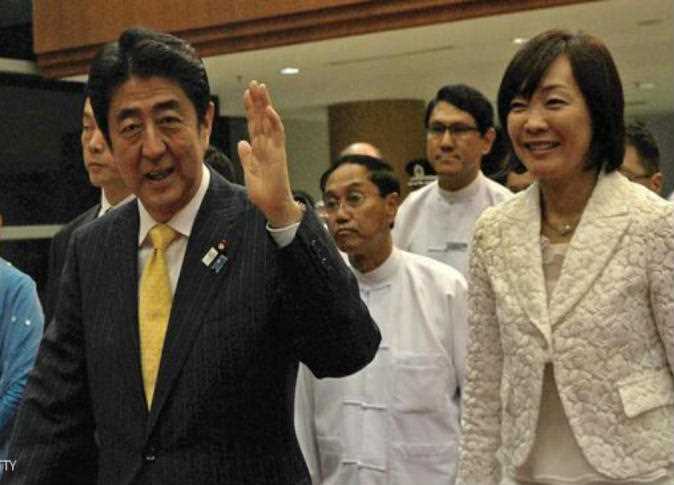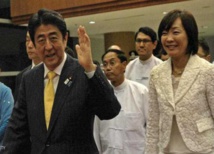Yokosuka, Japan (dpa) – Under the scorching sun, dozens of activists and residents came together in the port city of Yokosuka, south of Tokyo, calling on Prime Minister Shinzo Abe to abandon coal-fired plants at home and abroad.
Near the site of a planned coal-fired plant, they urged the premier to stop funding coal as his government approved eight coal-fired power plants abroad even the country signed on to the 2015 Paris Agreement.
Meanwhile, as the two-day G20 summit meeting kicks off in Osaka, Abe, who chairs this year’s gathering, vowed to take a leadership role in climate change.
The G20 leaders are set to discuss “environmental and global-scale issues,” the premier told reporters in Tokyo.
What has been little discussed in Japan however, is Japan's role as second-largest funder of coal fired-power plants after China. It is one of the very few G20 countries still building coal plants at home, environmentalists argue.
In addition to 109 existing coal power stations, Japan has 12 new plants operating, 18 are under construction and seven more are being planned, according to environmental group Kiko Network in the ancient city of Kyoto.
However, some operators decided to abandon their plans to construct new ones amid strong opposition from local residents and environmental groups.
People take it for granted to open the window to let clean air in, said Yukiko Konishi, a member of a citizens group in Chiba City.
But if there is a coal-fired plant nearby, “there is no guarantee of such a normal part of our lives due to coal dust,” said Konishi.
A plan to build a new coal-fired power station in Chiba was cancelled in December after fierce opposition by environmental organizations and citizens groups, including Konishi’s.
Operators that have cancelled their plans also recognized their countermeasures to reduce carbon dioxide emissions would be more costly, said Ayako Sekine, energy campaigner at Greenpeace Japan.
Earlier this month, Japan published its long-term strategy under the Paris Agreement, aiming to reduce greenhouse gas emissions to zero after 2050.
“Action against climate change is not a cost to the economy but a growth strategy toward the future,” Abe said after the release.
“We will create a virtuous cycle between environment (conservation) and economic growth and lead the paradigm shift of the world's climate policy,” he added.
Environmental groups blasted the plan, calling it “completely inadequate” for achieving the 1.5-degree target of the Paris accord.
Critics say Japan failed to invest more in renewables after the 2011 nuclear disasters forced power companies to shut down all reactors across the country. Instead, Abe’s government is keen to reinvigorate the nuclear industry.
Scientists say record-breaking temperatures and abnormal weather patterns across the world in recent years are clear evidence of climate change.
Japan is no exception. In early July last year, torrential rains in the western part of the country triggered floods and landslides, killing more than 220, the largest number of deaths in three decades.
Then, a heatwave swept across Japan for nearly two weeks before the arrival of typhoons with temperatures reaching record highs.
The number of those who died of heatstroke and other heat-related causes in July 2018 more than tripled from a year earlier to 1,032, according to the health ministry.
Environmental groups argued climate change is one of the urgent global challenges, they want Japan to play a leading role on the issue at the G20 summit.
“Given to global trend towards a carbon-free society, the G20 Summit in which Japan assumes presidency for the first time should be the perfect opportunity Prime Minister Shinzo Abe to demonstrate leadership in combating climate change by announcing Japan’s coal moratorium,” Kimiko Hirata, international director of Kiko Network, said.
Near the site of a planned coal-fired plant, they urged the premier to stop funding coal as his government approved eight coal-fired power plants abroad even the country signed on to the 2015 Paris Agreement.
Meanwhile, as the two-day G20 summit meeting kicks off in Osaka, Abe, who chairs this year’s gathering, vowed to take a leadership role in climate change.
The G20 leaders are set to discuss “environmental and global-scale issues,” the premier told reporters in Tokyo.
What has been little discussed in Japan however, is Japan's role as second-largest funder of coal fired-power plants after China. It is one of the very few G20 countries still building coal plants at home, environmentalists argue.
In addition to 109 existing coal power stations, Japan has 12 new plants operating, 18 are under construction and seven more are being planned, according to environmental group Kiko Network in the ancient city of Kyoto.
However, some operators decided to abandon their plans to construct new ones amid strong opposition from local residents and environmental groups.
People take it for granted to open the window to let clean air in, said Yukiko Konishi, a member of a citizens group in Chiba City.
But if there is a coal-fired plant nearby, “there is no guarantee of such a normal part of our lives due to coal dust,” said Konishi.
A plan to build a new coal-fired power station in Chiba was cancelled in December after fierce opposition by environmental organizations and citizens groups, including Konishi’s.
Operators that have cancelled their plans also recognized their countermeasures to reduce carbon dioxide emissions would be more costly, said Ayako Sekine, energy campaigner at Greenpeace Japan.
Earlier this month, Japan published its long-term strategy under the Paris Agreement, aiming to reduce greenhouse gas emissions to zero after 2050.
“Action against climate change is not a cost to the economy but a growth strategy toward the future,” Abe said after the release.
“We will create a virtuous cycle between environment (conservation) and economic growth and lead the paradigm shift of the world's climate policy,” he added.
Environmental groups blasted the plan, calling it “completely inadequate” for achieving the 1.5-degree target of the Paris accord.
Critics say Japan failed to invest more in renewables after the 2011 nuclear disasters forced power companies to shut down all reactors across the country. Instead, Abe’s government is keen to reinvigorate the nuclear industry.
Scientists say record-breaking temperatures and abnormal weather patterns across the world in recent years are clear evidence of climate change.
Japan is no exception. In early July last year, torrential rains in the western part of the country triggered floods and landslides, killing more than 220, the largest number of deaths in three decades.
Then, a heatwave swept across Japan for nearly two weeks before the arrival of typhoons with temperatures reaching record highs.
The number of those who died of heatstroke and other heat-related causes in July 2018 more than tripled from a year earlier to 1,032, according to the health ministry.
Environmental groups argued climate change is one of the urgent global challenges, they want Japan to play a leading role on the issue at the G20 summit.
“Given to global trend towards a carbon-free society, the G20 Summit in which Japan assumes presidency for the first time should be the perfect opportunity Prime Minister Shinzo Abe to demonstrate leadership in combating climate change by announcing Japan’s coal moratorium,” Kimiko Hirata, international director of Kiko Network, said.









 Home
Home Politics
Politics











